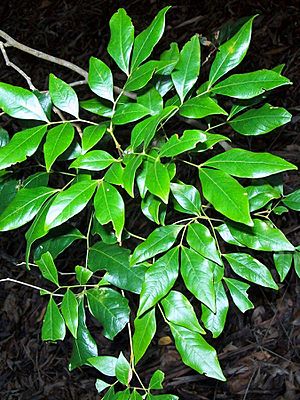Veiny Lace Flower facts for kids
Quick facts for kids Veiny Lace Flower |
|
|---|---|
 |
|
| Scientific classification | |
| Kingdom: | |
| (unranked): | |
| (unranked): | |
| (unranked): | |
| Order: | |
| Family: | |
| Genus: |
Archidendron
|
| Species: |
A. muellerianum
|
| Binomial name | |
| Archidendron muellerianum (Maiden & R.T.Baker) I.C.Nielsen
|
|
| Synonyms | |
|
|
The Veiny Lace Flower, also known as Archidendron muellerianum, is a special tree. It lives in the rainforests of eastern Australia. This tree is quite rare, meaning there are not many of them left in the wild.
Contents
Meet the Veiny Lace Flower
The Veiny Lace Flower is a type of tree that grows in warm, wet places. It is known for its unique leaves and pretty flowers. This tree is an important part of the rainforest ecosystem.
What's in a Name?
This tree was first given a scientific name in 1896. Two scientists, Joseph Maiden and Richard Thomas Baker, named it Albizia muelleriana. Later, another scientist named Nielsen changed its name to Archidendron muellerianum.
The second part of its name, muellerianum, honors a famous botanist. His name was Ferdinand von Mueller. He was a very important plant expert in Australia a long time ago.
How It Looks
The Veiny Lace Flower can grow quite tall. It can reach up to 20 meters (about 65 feet) high. Its trunk has grey bark and can be as wide as 60 centimeters (about 24 inches). Sometimes, the base of the trunk has special wide supports called buttresses.
Leaves and Trunk
The leaves of this tree are very interesting. They grow in a special way called "bipinnate." This means each leaf has two main stalks. On these stalks, there are several smaller, oval-shaped leaflets. These leaflets are shiny and can be 4 to 13 centimeters (about 1.5 to 5 inches) long. They are also 2 to 5 centimeters (about 1 to 2 inches) wide. You can see clear veins on both the top and bottom of these leaflets.
Flowers and Seeds
The Veiny Lace Flower has tiny white flowers. They usually appear in November and December. These small flowers grow together in round, white clusters. Each cluster can be about 2.5 centimeters (1 inch) across.
After the flowers bloom, they turn into seed pods. These pods are wrinkled and reddish-brown. They grow to be about 10 to 13 centimeters (4 to 5 inches) long. The pods ripen between April and December. Inside, the pods are bright orange. They hold shiny black seeds.
Where It Lives
The Veiny Lace Flower grows in a specific part of Australia. You can find it from Alstonville, New South Wales, north to the Gold Coast, Queensland in south-eastern Queensland. It prefers to live in coastal or subtropical rainforests.
Sadly, many of the places where this tree used to grow have been cleared. These areas were used for farming and building houses. Because of this, the Veiny Lace Flower is now a rare plant. Protecting its remaining rainforest homes is very important.

